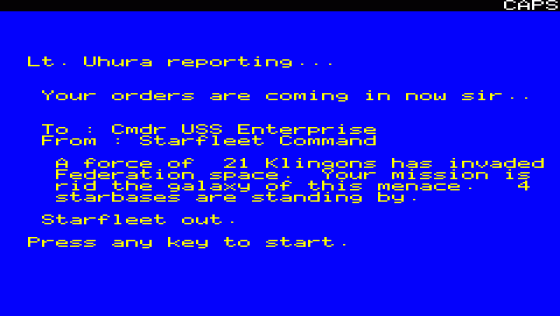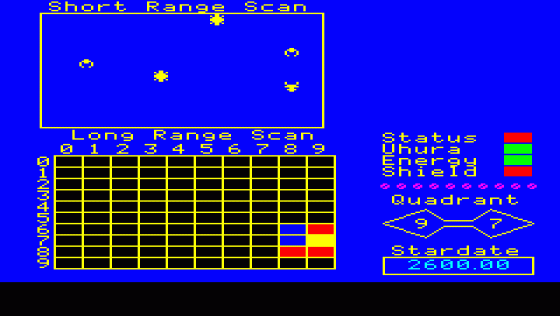
Personal Computer News
 27th May 1983
27th May 1983
Categories: Review: Software
Author: Shirley Fawcett
Publisher: A 'n F
Machine: Oric 16K
Published in Personal Computer News #012
To launch our series of round-up pages, Shirley Fawcett puts the finger on Oric games.
Oric Extravaganza
To launch our series of round-up pages, Shirley Fawcett puts the finger on Oric games
Oric games are finally starting to bust out all over, and all those benighted souls who've been waiting for the machine are getting their hands on it at last. We have had a fair number of Oric tapes plopping through our letterbox, so this week we've given a bunch of them a speedy spin.
Death Satellite
"You have materialised on Death Satellite", trumpets Adventure 1 from A&F Software. Also known as Death Satellite, there is a terrible tale of geiger counters and deserted space stations, skeletons on beds and radioactive waste rooms, and radiation pills that don't work.

Death Satellite, despite its rather technicolour name, is a plain black-and-white (-and-occasionally-red) text adventure, with what looks like a fair number of twists and turns, and a good-sized space station to explore.
You kick off with the obligatory loud Oric squeak - the only sound effect I came across in a game where even the geiger counter doesn't actually tick - and with a scrappy little sheet of instructions telling you ten of the usual TAKE, NORTH etc commands.
There are lift shafts and control rooms, medical centres and engineering workshops to be found. You also need fuel, if you are ever to make a getaway from the Death Satellite. But the only getaway you're likely to make will be the one I made several times - by dropping dead from radiation sickness.
Othello
Othello, from Kenema Associates, is a version of the well-worn computer game where you slap your counters either side of your opponent's and see their counters change colour to become yours.
The instructions for this one are fairly good, although they're only there within the program, not printed on the packaging. But there are other drawbacks.
Yes, it is true, the Oric is a micro that prides itself on its sound-generating abilities. But good grief, must eager Othello players racking their brains to plan their game strategy five moves ahead have their ears assaulted?
And therein lies the other rub with this game. If you opt to play against the computer - and let's face it, there's not much point in buying a computer cassette if you just want to play a board game with another human being! - you might as well allow a good afternoon for every time you play. You'll need it.
I started the game up. A bright red board, with two 'black' - actually transparent red - and two white pieces at the centre appeared. I asked the Oric to make the first move. More than three minutes later, it was still thinking deeply about what to do next. Even after it finally made up its mind, it had the nerve to announce that it was 'Checking' the new move, which it made in a flurry of really very loud Space Invaders noises.
"You must realise that the Oric plays a fairly high level game, and because of this takes a fair time to think before it moves," the instructions warn you. Indeed.
Oric Trek
Oric Trek comes from Salamander Software, and if I thought Othello was loud, Trek leaves it way behind. It's something of an empty-room-behind-closed-doors job. Still, Star Trek was meant to be played with volume turned up, and this version won't disappoint in that respect.
Oric Trek is more or less the same animal that Salamander has already put out for the Dragon and others. It comes in the usual tough plastic box with a Chekhov or Kirk or somebody on the cover. This character looks a bit like Rudi Nureyev about to have his teeth out in front of Spaghetti Junction - but it beats the packaging on most Oric software.
You choose your game's level of difficulty, and its length - anything from long to even longer, based on the size of galaxy you get to defend. You are issued with a ten page manual telling you how to play, and trotting you through the meanings of the Status Light, the Energy Warning Light and the Uhura Light.
You can launch hyperprobes and photon torpedoes, and fire your phasers, instruct Scotty to power up the shields, whizz around the galaxy on quadrant power and dock with Starbases. You can ge shot at by Klingons and fly into supernovae and fall down black holes. And finally, if all else fails, you can blow up spectacularly. Stirring stuff.
Multigames
Tansoft's own Oric Multigames 1 is altogether quieter. Five - yes, count them - games reside on this cassette, just waiting to provide you with 'Hours of Family Fun'. Take your pick or two from Bandit, Projectiles, Colour Match, Quest and Reversi.
I had a go with Quest, which turned out to be a fairly decent adventure game set among the usual fantasy props or rambling forests, caverns, ravines, mazes and oaken doors, usually locked. I found a spot marked 'Bilbo Was Here', but no Bilbo.
I also found no way out of the adventure.
Bandit, on the other side of the tape, turned out to be a fruit machine game, and had the whole PCN office cracking-up with laughter. It doesn't do much but what it does, it does with very silly sound effects. There's a very nasty melody that gets played each time you pull the handle of your machine and the reels spin around. Then, if you hit the jackpot, there's a rather bizarre set of zap, zap, zap sounds and the sight of round things - presumably coins - falling out of the machine's payout slot.
As for Projectiles and Colour Match, I couldn't get them to load for love nor money. Reversi I did manage to raise from the dead, only to find a less elegant-looking and even slower-playing version of Othello than the Kenema one. Here, the board is no more than a matrix of red dots, and although you're asked to name your moves by entering X,Y numbers, no X or Y is marked on the axes of the board.
Awari
Awari, from Kenema once more, is pleasant enough, if rather unambitious. It's that good old African game where you move stones around 12 holes. The instructions for this game are once again only to be found within the game, not on the cassette label, but it's easy to get the hang of it.
Unfortunately, there's not a lot to this game. The board is simply a green rectangle numbered top and bottom, there are different levels of play, and there's a jolly chinking sound as you move the stones around the board.
Out-Takes
At least Awari loads! Among the PCN pile of the also-rans for the Oric - that's games that simply would not load at all - are Zodiac Adventure from Tansoft, an everyday tale of treasure hunting with - apparently - lots of sound effects, music and colour, and Salamander's Games Compendium, featuring such goodies as Donkey Derby, Kingdom, Viper and Space Station.
Other Reviews Of Death Satellite For The Oric 16K
Death Satellite (A 'n F)
A review by G.P. (Home Computing Weekly)
Death Satellite (A 'n F)
A review by S.I. (Home Computing Weekly)



